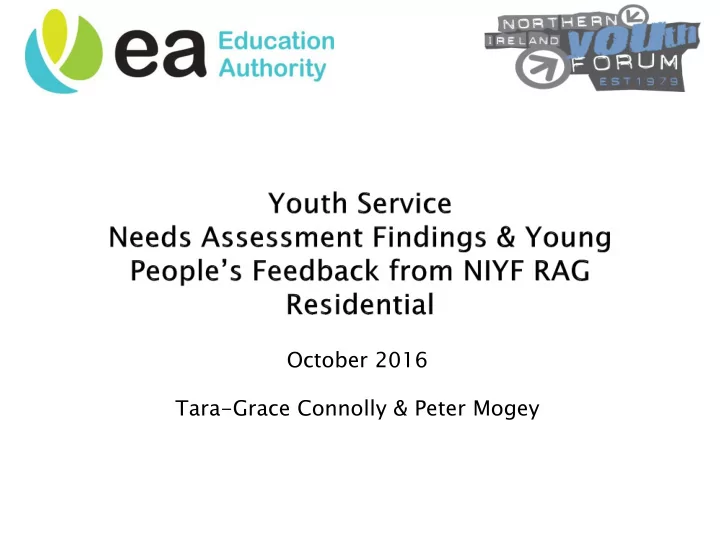

October 2016 Tara-Grace Connolly & Peter Mogey http://www.eani.org.uk
Between June and September this year, the Planning and Monitoring Group have conducted a survey of Young People as part of the Regional Assessment of Need. The survey is designed to find out Young People’s views on the big issues for them in their lives and communities and about their experiences of Youth Work. The survey was distributed to young people via RVYOs and EA; It included an online survey.
The survey has been completed by 1088 young people. This includeed 602 (55.5%) Females, 472 (43.5%) Males and 11(1%) other. The largest response was from 14-18 year olds, with 699 responding. There were also 259, 18+ year olds and 128, 9-13 year olds who responded.
Attended by over 60 young people from RVYOs; EA groups as well as those never involved in youth work. Workshops and Activities focusing on RAG and RYDP. Feedback and in depth discussion on survey findings.
Response Response Issues Percent Count Exam Stress 48.3% 526 Body Image 35.0% 381 Boredom 34.9% 380 Confidence 34.6% 376 Mental Health 30.2% 329 Careers 22.4% 244 Relationships 21.9% 238 Bullying 16.9% 184 Alcohol 16.6% 181 Health 14.8% 161 Drugs 10.8% 117 Transport 10.1% 110 Suicide 9.5% 103 Smoking 8.6% 94 Sexual Health 6.8% 74 Culture 6.4% 70 Discrimination 6.3% 68 Sectarianism 6.3% 68 Sexual Orientation 5.5% 60 Other (please specify) 5.2% 57 Racism 3.3% 36 Legal Highs 3.2% 35 Gender Issues 2.8% 30 Migration 1.5% 16
Young people highlighted the following as key issues: ◦ Boredom & need for more opportunities; ◦ Alcohol; Drugs; Smoking & Legal Highs should all be linked together in the findings = 35.7% of respondents highlighted these making this the second most important issue. ◦ Similarly – body image; mental health; confidence; suicide could / should be grouped = 108.5% and arguably classified under ‘mental health’ – consistently been the top issue in NIYF surveys over the past number of years – ref: MYM; UNCRC; NIYC ◦ Young people want to ‘find their place in society’; be valued and end negative stereotyping; ◦ Need for support - particularly at times of crisis ◦ ‘Paramilitaries’ – cited as an often ‘unseen’ issue for young people
Response Response Programme/a e/activ tivities ities Percent Count Opportunities to Travel 35.3% 384 Qualifications 33.4% 363 Sport 30.5% 332 Residentials 29.0% 316 Events 24.8% 270 Awareness Raising 24.4% 265 Volunteering 23.8% 259 Life Skills Programmes 23.8% 259 Outdoor Education 20.2% 220 Late Nights 19.9% 216 Meeting young people from different communities or ethnic 19.8% 215 backgrounds. Leadership Programmes 14.3% 156 Personal and Social Development Programmes 13.0% 141 Art 12.6% 137 Drop in 11.9% 130 Drama 11.3% 123 Media 10.2% 111 Inter-club activities 9.9% 108 Weekend Opening 8.5% 92 Peer Education 7.1% 77 School Based Programme 6.4% 70 Community Relations Work 5.1% 55 Youth Councils/Forums 3.7% 40 Other (please specify) 3.4% 37
Flexible youth led approach to youth work important – ability to respond to needs; at times that suit need. Too much focus on ‘qualifications’ and not enough on ‘life skills’ - education does not have to mean GCSEs and A levels. Experiential learning; new opportunities and experiences; non formal training and capacity building were cited as sometimes more important. Furthermore, young people highlighted that qualifications should be offered as ‘a side’ to projects – not the main aspect of them. New opportunities; overseas experiences; intensive work including programmes for older young people needed.
Aspect t of youth provision ion Response Percent Response Count 53.2% 579 Friendships 36.0% 392 Youth Workers 31.2% 339 Activities 25.6% 279 Place to hang out 23.4% 255 Being involved 20.7% 225 Sense of belonging 17.4% 189 Gaining qualifications 16.4% 178 Programmes 12.0% 131 Opportunities for progressing into Leadership 9.2% 100 Opportunities to Travel Opportunities to meet young people from different communities or 7.7% 84 ethnic backgrounds 3.7% 40 Other (please specify) 2.9% 32 Opportunities for Community Relations work
Most positive aspects of youth provision as highlighted in focus groups: ◦ Cross Border Projects; ◦ Rights based programmes; ◦ Overseas experiences; ◦ Participation / Youth Voice and Youth Democracy projects – were young people connect directly with decision makers were highlighted as important. ◦ Peer Education Programmes; ◦ Charitable work; ◦ Intense Personal and Social Development Programmes – e.g. ‘Full Time Programmes’ where young people meet 3 or more days a week; 6-7 hours a day;
Acti tivities ities Response Percent Response Count 50.6% 550 More Activities 45.6% 496 More Facilities for Young People 40.1% 436 More Programmes 29.4% 320 More Volunteering Opportunities 27.9% 304 More Qualifications 21.0% 228 Extended Opening Hours 13.3% 145 More Community Relations 9.7% 106 More Peer Education 5.2% 57 Other (please specify)
More for those with Special Educational needs; One to one support; Some described youth service as ‘outdated’; ‘for younger children’; ‘adult led’. Young People discussed the need for improved youth provision – where young people set the agenda; Funding was discussed including short term approach and how young people feel that they are the big losers when it comes to cuts and austerity.
Young people are keen to have a say on the design and delivery of Youth Work; Young people would like more investment in ‘things that have proven to work’; Government needs to listen an act – young people are asked over and over again – and give the same answers. Time for action!
Recommend
More recommend